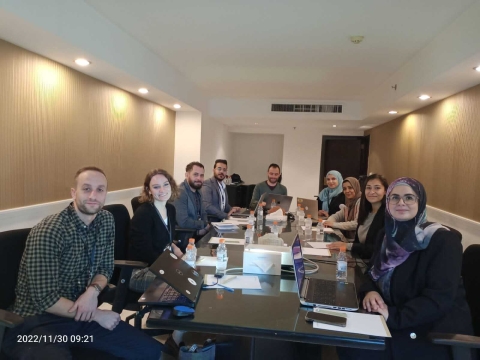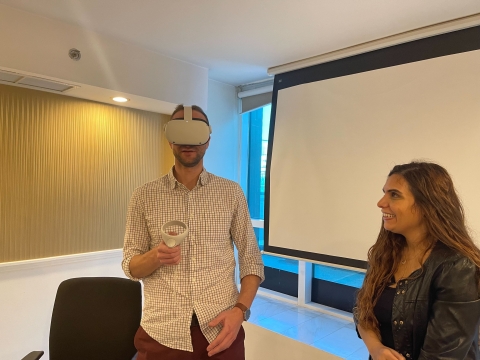I have learned how to deal with donors, how to write a project proposal and budget proposal, how to increase the audience using the search engines, and how to develop a brand visual identity. The Mentoring Center is a school of knowledge and pioneering experiences at the Arab and international levels.
-Youssef Askour (Morocco, 2021)
It is tough – and may be dangerous - to be an independent journalist in the Middle East and North Africa (MENA). Several countries in this region face repressive regimes and/or have become closed environments. The number of countries where journalism can be seen as a threat and where journalists can be considered enemies is growing fast. It’s also challenging for independent media founders, in MENA and elsewhere, to develop sustainable businesses that thrive long term.
With the support of the National Endowment for Democracy, in 2014, ICFJ launched IJNet Arabic’s Mentoring Center, a program that aims to support professional and citizen journalists who are working in the MENA region. The initiative offers its participants several training sessions, months of one-on-one mentorship, and also the possibility to apply for seed funding – all ingredients they need to launch a news media startup and actually succeed.
If you are running a platform that is focused on covering corruption cases, accountability, and politics, ICFJ encourages you to apply.

How it works
IJNet Arabic’s Mentoring Center prioritizes journalists and journalism projects that focus on improving governance in the MENA Region and promoting collaborations. Every year ICFJ selects two cohorts (of up to 16 journalists total) to work together and enhance their professional skills by connecting them with some of the brightest specialists in journalism, marketing, and financial sustainability.
The initiative is divided into three phases:
- Several in-group training sessions: Participants will attend weekly sessions to strengthen their journalistic skills. These meetings might take place virtually (due to COVID-19) and lead to in-group conversations.
- One-on-one mentorship for project development: A top expert will mentor each fellow individually to make sure their startup idea is well developed and ready to take off. At the end of the mentorship, participants will pitch their projects to a high-level board and be eligible to receive seed funding.
- Bootcamp meeting: ICFJ organizes a 2- to 3-day in-person meeting to allow participants to meet each other, their mentors and a few Mentoring Center alumni. This is a great opportunity to network and build strong regional connections.
During the program, participants will be asked to pitch and write articles for IJNet in Arabic, as an opportunity to raise awareness of important issues discussed in the Mentoring Center.
Who should participate?
IJNet Arabic's Mentoring Center is suitable for you if:
- You are a professional or citizen journalist based in the Middle East and North Africa
- You need help launching and developing your own news media startup
- You have launched your news media startup and would like to help it grow
- You are struggling with the financial sustainability of your startup
- You believe you need to enhance your journalistic skills
- You aim to strengthen democracy in your region through your journalism
- You would like to build regional connections with other Arabic-speaking journalists
- You are 100% focused on finding ways to turn your media outlet into a sustainable initiative
- You are ready to commit to a one-year program (from September 2022 to April 2023) and dedicate up to 5 hours a week to it
Eligibility criteria
Applicants must be based (live) in the MENA region Applicants must have an idea, a project, or a media startup they want to launch/develop. Applicants must be ready to commit to a one-year program and dedicate up to five hours per week to it.
This is what previous participants have to say about the program:

Ali Alibrahim, founder of Siraj, the first Syrian investigative unit (Syria): "The training I received helped me refine my media identity. The weekly meetings and mentorship benefited me to maintain the sustainability and continuity of my project."
Hadeel Arja, co-founder of Tiny Hand and Frontline in Focus (Syria): "I was very excited to join a program that would support and energize me. I needed to have a sense that I was not alone on this journey especially in the beginning when I was having lots of doubts about whether I was on the right path or not. Was I missing out on other opportunities while working on this project? Was I going to be successful? But after joining [the Mentoring Center] I had all the answers to these questions."
Fadi Hasany, founder of Last Story (Palestine): "My digital media initiative witnessed a complete transformation in terms of idea development and rebuilding based on the models, plans, and training that I received from the Mentoring Center, until I managed to receive funding for the project."
Hanane Betache, manager of Aqwas platform (Algeria): My digital media initiative has changed a lot since my participation [in the Mentoring Center], especially in terms of setting the ideas and creating the content. This helped me think about the team and how I can receive funding for my initiative which was in a bad financial phase before participating in this program."
Dares Badani, head of the Media Center for Persons with Disabilities (Yemen): "We have produced a radio series called ‘Badi and Amal,’ consisting of 30 episodes that were broadcast on 13 local radio stations, in Sana'a, Hadhramaut, Aden, Al Hudaydah, Marib, Shabwa, Mahra, Ibb governorate and Taiz. It was the first series specialized in highlighting the issues and rights of people with disabilities in Yemen in a simple way that reaches all of society."
FAQ:
Are there any costs to participating in IJNet Arabic's Mentoring Center?
There are no costs to apply or participate in the program. All ICFJ wants is your commitment to spending up to five hours a week dedicated to the Mentoring Center and we will keep track of your engagement!
What are the target countries in this program?
The program is focused on countries located in the Middle East and North Africa. Applicants must be based (live) in the region.
What level of English proficiency is required?
The program is fully run in Arabic, so English-language proficiency is not required.
What are the requirements to participate in the Center?
- You are a professional or citizen journalist based in the Middle East and North Africa.
- You have a good idea and need help to launch your own news media startup.
- You have launched your news media startup and would like to make it grow.
- You are struggling with the financial sustainability of your project/startup.
- You believe you need to enhance your journalistic skills.
- You would like to build regional connections with other Arabic-speaking journalists
- You are 100% focused on finding ways to turn your media outlet into a sustainable initiative
- You are ready to commit to a one-year program (from September 2022 to April 2023) and dedicate up to 5 hours a week to it
How much time should the participant dedicate to this program?
The MENA Mentoring Center is a one-year program. Training sessions will be offered throughout this period. Mentorship will last a few months and the boot camp is 2-3 days long.
How significant is the seed funding offered by the program?
It depends on the year and the cohort. But It has ranged from USD$1,500 to $5,000.
More about this program
Contact Info
News about this program
- June 6, 2025
Sustaining Journalism in Exile: New Toolkit Released
- December 30, 2024
IJNet's Top 10 Crisis Reporting Resources Published in 2024
- December 5, 2024
Fundamentals of Open-Source Intelligence for Journalists


